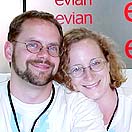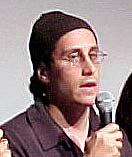|
|
 |
 |



- We asked the directors three questions.
|

|
Do you think that digital technologies will someday completely (100%) take the place of film?
|

|
Do you think that short film will establish itself as an entertainment genre?
|

|
Which Japanese directors do you like?
|






|

|

I don't think that everything will switch to digital. I also think that many people are caught up in the charm of film-we have an expression that some things can only be captured on film. This expression can't be expressed in digital terms-I want to think that film will go on forever.

I think that because of the internet now, short films are becoming popular. In the '30s and '40s, before the advent of longer feature films, people went to see shorts. So in the future, I'd say that a revival of that style could become popular again. Features and short films have been brought together on cable TV and other film channels, and I think that in the future they'll become a big source of entertainment. That's what I personally am hoping for.

I love Kurosawa's Seven Samurai. And I love The Magnificent Seven and Bruce Willis's Last Man Standing-they were both inspired by Kurosawa. Also, there are so many good Japanese films at this festival; it's overwhelming.

|
Jon, who produced "Oregon," came out of the Air Force to then work in hotel management for several years-a unique background for filmmaking. While working at the hotel, he steadily wrote his screenplay.
"When I was working at the hotel, I kept thinking to myself, 'This is not what I really want to do.' Because I loved movies, and because I'd written a screenplay, I went up to my boss one day and announced, 'I quit." And then I proposed to the director of 'Oregon,' Rafael, that we make a movie."
While 'Oregon' depicts an anti-smoker regime in near future hunting down smokers through clues from cigarette butts, Jon says that he's a regular smoker. "What I wanted to depict in this film was, for example, that wild feeling of old Westerns as they catch the bad guy by smelling or actually tasting the traces he's left behind. While the setting here is the near future, I wanted to depict someone using an extremely primitive method for tracking a criminal."
"Oregon" is Jon's first film, and he has begun work on a new script, with the hopes of directing the film at the end of the year.
Short films are often said to be a foothold toward making a feature film. We asked him what kind of feature film he saw as his goal: "I don't think of this film as merely a foothold, but filmed it as a complete work in its own regard. I've never thought that short films were inferior to longer films."

 |




|

|

Just as books remained despite the fact that when the internet came out everyone was saying that they might disappear, I don't think that film will disappear either-because everyone likes film. (Gail)
I think that it's possible that we might switch to digital-its quality is improving all the time. But because there are many things you can do on film that you can't do on digital, I'd prefer not to switch, if possible. (Colin)

I think that short films are establishing themselves as a genre. But I'm not sure that everyone will be able to accept it as such. (Gail)
Because short films are easier and much less expensive to make than features, I think that more young filmmakers will make them as a way of getting starting. (Colin)

Kurosawa Akira, of course. And Kitano Takeshi, too. (Gail)
Yeah, Kurosawa. (Colin)

|
Since studying theater at Columbia University's graduate school, Colin and Gail have written and directed theatrical plays, both together and on their own.
On what inspired them to want to make films:
Gail: "For plays, language is central. But with film, in addition to language, you can also express things through images. I just wanted to make something from a more filmic point of view."
Colin: "We're living in Los Angeles now, and of course we are surrounded by people who are making movies, so I decided that I wanted to give it a try, too. I love plays, of course. But because I also love to watch movies, it's quite natural for me to come to want to make films."
On the differences between making films and making plays:
Gail: "At a play, the audience can look at anything they want to look at on stage. A filmmaker, in comparison, can wring out exactly what he or she wants the audience to see. Thus, with film, I think I can more easily convey directly to the audience exactly what I want to. This is because while plays are viewed through the imagination of the audience, film is a medium through which an audience receives the filmmaker's world more directly."
Colin: "Because more people will see a film than will see a play. We wanted more people to see 'Seraglio.'"
Gail and Colin directed "Seraglio" together, so we asked if they had had to distinguish each other's roles and responsibilities:
Colin: "We didn't decide on any particular role division-we just did the same things. While we did have differences of opinion on editing, [but] because we were able to try out things over and over again, we were able to consider all our possibilities together."

 |




|

|

I don't think that it will completely take the place of film, but of course since a film can be made with digital technologies quite cheaply, it will certainly continue to be developed. I think that using film is very romantic-if you put it up to the light you can see what's reflected there, and I'd guess that there are people who will always continue to use film.

I think that short film has already established itself as a genre. And within shorts, there are all kinds of established genres such as documentary or comedy.

Kurosawa Akira. Its unfortunate, but Americans aren't able to watch Japanese films the to the extent that Japanese can watch Hollywood films. Because 95% of the movies in American theaters are from Hollywood, with a remaining 5% for independent and foreign films, we really haven't had much opportunity to watch recent Japanese films.

|
After graduating from Cornell University's computer science department, David continued on to Columbia University's graduate school to study film.
"Because computers are often used in the editing stage, it's been really helpful for me to have come out of computer science. I used a computer to generate the opening credits and background scenes for 'Zen.' Because even while it's completely shot on film, you can edit it afterwards more cheaply using a computer."
At Columbia, he mainly studied directing, he says. But his reason for choosing Columbia was not because he wanted to study technique, but rather because he would be able to have there the creative experiences he wanted-learning alongside actors, for example.
When asked about any difficulties he encountered in making "Zen," he explained,
"First of all, because it was set in a single enclosed room, I really paid attention to whether I could keep the attention of the audience. Also, because so many people were moving around this single space, the audience could get lost watching it. So I decided to make a plan that divided the room into separate areas and set up where the camera would be placed, so that the audience could keep track of the characters' movements."
Asked about his next filmmaking plans, he replied,
"Actually, I plan to join forces with Dan, the director of 'Delusions in Modern Primitivism,' to make my next movie. Dan will direct and I'll write the script. Because I'm also going to act in it, I'm really starting to get nervous."
Finally, he offered some advice to young people who want to become directors:
"Don't be even a little bit shy. Going to film school is one step, but it's not the only way. Among my friends, there are also people who've never gone to film school, but are making films while working at a normal job. It's a bitter battle, because so many people are looking to become filmmakers. At any rate, you have to work hard!"

 |




|

|

For me, I would like to continue working with film.

In Singapore, I think that it's already become established. Within the work of a single short film, you can convey what you want to say very concisely. Maybe they've been well received because the MTV generation has a hard time maintaining its concentration level for longer feature-length movies.

I've forgotten the name of the director, but Wonderful Life (note: Koreeda Hirokazu ), Suo Masayuki's Sumo do/Sumo don't, and Kitano Takeshi's Hanabi. Also, Love Letter (note: Iwai Shunji)-I cry every time I watch it.

|
Singapore's Royston, though only 24 years old, has received a total of 8 domestic and foreign awards for his works over the past four years. On his reasons for his beginning to make films, he explains, "Because I wasn't very good at studying, my mother advised me to go to an art school. So when I was 16, I enrolled in art school, and after getting a year's foundation in art, I specialized in film in my second year. Then I made my first film when I was 18."
"Sons," which depicts a Chinese father and son, is a work that is filled-in both its images and its music-with a very Eastern kind of feeling, so he was surprised that the reception of this film was exactly the same in Asia as it was in Europe and America. "When I saw these reactions, I realized that the father/son relationship depicted in this work was actually a very common theme," he says.
This film has also received very high praise from the famous Iranian director, Makmalbaf, who called it, "One of the best films I've seen in six years." Royston remembers, "Director Makmalbaf hugged me and said, 'Thank you for giving us such a wonderful thing.'"
On the production of "Sons," what gave him the most difficulty was, of course, money. "It was terrible, because-especially for the film equipment-I had to pay for everything the day after I borrowed it. As for my staff, friends about my own age helped me out. I even mobilized my mother to adjust the lights" (laughs).
Someday the future, Royston wants to make another film about human relationships. While in "Sons" his main character is a father, his next film will be about women-in particular, he'd like to try to depict a mother. Royston also wants to make films that aren't influenced by anyone else's work, but only show his own personal style. He is now undertaking a multimedia work that fuses together film, drama, dance, and music.

 |
 |
 |
Copyright, (C) American Short Shorts Film Festival 2001. All rights reserved.
Feedback to assff2001@hotmail.com |
|
|